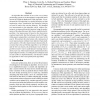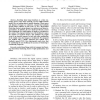111 search results - page 15 / 23 » Orthogonal Feature Learning for Time Series Clustering |
TFS
2008
13 years 7 months ago
2008
Abstract--This study proposes an efficient self-evolving evolutionary learning algorithm (SEELA) for neurofuzzy inference systems (NFISs). The major feature of the proposed SEELA i...
ICCAD
1997
IEEE
13 years 11 months ago
1997
IEEE
An algorithm that remains in use at the core of many partitioning systems is the Kernighan-Lin algorithm and a variant the Fidducia-Matheysses (FM) algorithm. To understand the FM...
ICPR
2010
IEEE
13 years 5 months ago
2010
IEEE
Abstract--Searching large image databases is a time consuming process when done manually. Current CBIR methods mostly rely on training data in specific domains. When source and dom...
BMCBI
2006
13 years 7 months ago
2006
Background: The use of global gene expression profiling to identify sets of genes with similar expression patterns is rapidly becoming a widespread approach for understanding biol...
CIKM
2011
Springer
12 years 7 months ago
2011
Springer
In most of the cases, scientists depend on previous literature which is relevant to their research fields for developing new ideas. However, it is not wise, nor possible, to trac...


